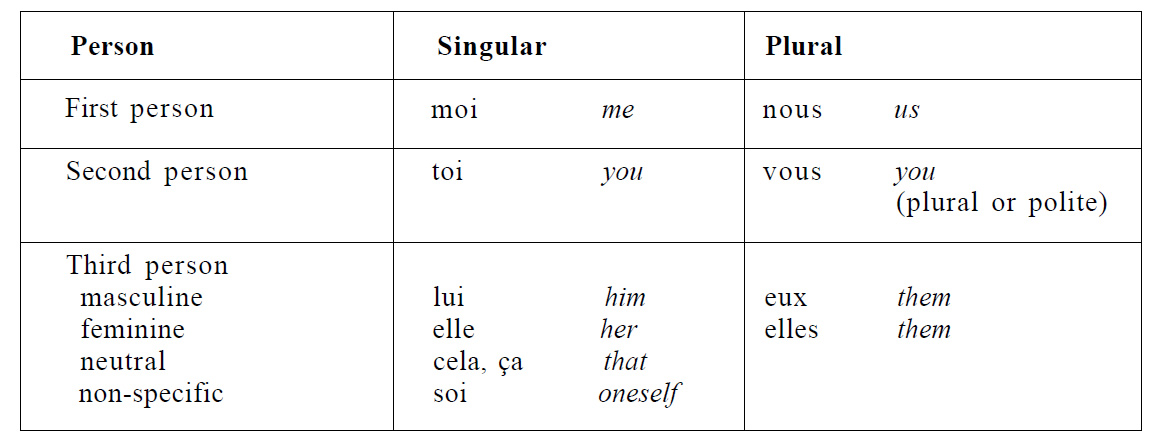Difference between revisions of "Language/French/Grammar/Stressed-pronouns"
Jump to navigation
Jump to search
(Created page with "thumb <div style="font-size:300%"> Stressed pronouns</div> ==Summary table of stressed pronouns== File:French-Language-Stressed-Pro...") |
m (Quick edit) |
||
| (3 intermediate revisions by 2 users not shown) | |||
| Line 1: | Line 1: | ||
[[File:French-Language-PolyglotClub.png|thumb]] | [[File:French-Language-PolyglotClub.png|thumb]] | ||
<div | <div class="pg_page_title"> Stressed pronouns</div> | ||
__TOC__ | |||
==Summary table of stressed pronouns== | ==Summary table of stressed pronouns== | ||
[[File:French-Language-Stressed-Pronouns-PolyglotClub.jpg]] | [[File:French-Language-Stressed-Pronouns-PolyglotClub.jpg]] | ||
==Video: Pronoms toniques: moi, toi, etc. (Stressed Pronouns)== | |||
<youtube>https://www.youtube.com/watch?v=jOOxZwyaCSs</youtube> | |||
==Videos== | |||
===LEARN FRENCH GRAMMAR - STRESSED / DISJUNCTIVE / TONIC ...=== | |||
<youtube>https://www.youtube.com/watch?v=yreEkavicaU</youtube> | |||
===Disjunctive / Stressed Pronouns in French - YouTube=== | |||
<youtube>https://www.youtube.com/watch?v=uHvsSlXjK38</youtube> | |||
===Moi Toi Lui Elle Nous Vous Eux Elles - French Emphatic/Stressed ...=== | |||
<youtube>https://www.youtube.com/watch?v=11KUkGmjZ30</youtube> | |||
===FRENCH EMPHATIC / STRESSED PRONOUNS (Moi, toi, lui, soi ...=== | |||
<youtube>https://www.youtube.com/watch?v=76FjzKebUkg</youtube> | |||
==Other Lessons== | |||
* [[Language/French/Grammar/Nouns-which-refer-both-to-males-and-to-females|Nouns which refer both to males and to females]] | |||
* [[Language/French/Grammar/Conjugation-group-2-—-verbs-whose-infinitive-ends-in-—ir|Conjugation group 2 — verbs whose infinitive ends in —ir]] | |||
* [[Language/French/Grammar/Order-of-multiple-pronouns-with-imperatives|Order of multiple pronouns with imperatives]] | |||
* [[Language/French/Grammar/How-to-recognize-when-the-start-of-a-relative-clause-is-a-direct-object|How to recognize when the start of a relative clause is a direct object]] | |||
* [[Language/French/Grammar/Reflexive-use-of-me,-te,-se,-nous,-vous|Reflexive use of me, te, se, nous, vous]] | |||
* [[Language/French/Grammar/Hyphens-in-Cardinal-Numbers|Hyphens in Cardinal Numbers]] | |||
* [[Language/French/Grammar/Collective-nouns|Collective nouns]] | |||
* [[Language/French/Grammar/Use-of-l'on|Use of l'on]] | |||
* [[Language/French/Grammar/Adjectives-used-as-adverbs|Adjectives used as adverbs]] | |||
* [[Language/French/Grammar/Summary-table-of-subject-pronouns|Summary table of subject pronouns]] | |||
* [[Language/French/Grammar/Location-of-adverbs-modifying-verb-phrases|Location of adverbs modifying verb phrases]] | |||
* [[Language/French/Grammar/Plurals-of-nouns-ending-in-s,-x,-z|Plurals of nouns ending in s, x, z]] | |||
* [[Language/French/Grammar/Quantifiers-and-personal-pronouns|Quantifiers and personal pronouns]] | |||
* [[Language/French/Grammar/Direct-Object-Pronoun|Direct Object Pronoun]] | |||
* [[Language/French/Grammar/Adjectives-with-complements|Adjectives with complements]] | |||
<span links></span> | |||
Latest revision as of 13:55, 27 March 2023
Stressed pronouns
Summary table of stressed pronouns[edit | edit source]
Video: Pronoms toniques: moi, toi, etc. (Stressed Pronouns)[edit | edit source]
Videos[edit | edit source]
LEARN FRENCH GRAMMAR - STRESSED / DISJUNCTIVE / TONIC ...[edit | edit source]
Disjunctive / Stressed Pronouns in French - YouTube[edit | edit source]
Moi Toi Lui Elle Nous Vous Eux Elles - French Emphatic/Stressed ...[edit | edit source]
FRENCH EMPHATIC / STRESSED PRONOUNS (Moi, toi, lui, soi ...[edit | edit source]
Other Lessons[edit | edit source]
- Nouns which refer both to males and to females
- Conjugation group 2 — verbs whose infinitive ends in —ir
- Order of multiple pronouns with imperatives
- How to recognize when the start of a relative clause is a direct object
- Reflexive use of me, te, se, nous, vous
- Hyphens in Cardinal Numbers
- Collective nouns
- Use of l'on
- Adjectives used as adverbs
- Summary table of subject pronouns
- Location of adverbs modifying verb phrases
- Plurals of nouns ending in s, x, z
- Quantifiers and personal pronouns
- Direct Object Pronoun
- Adjectives with complements

